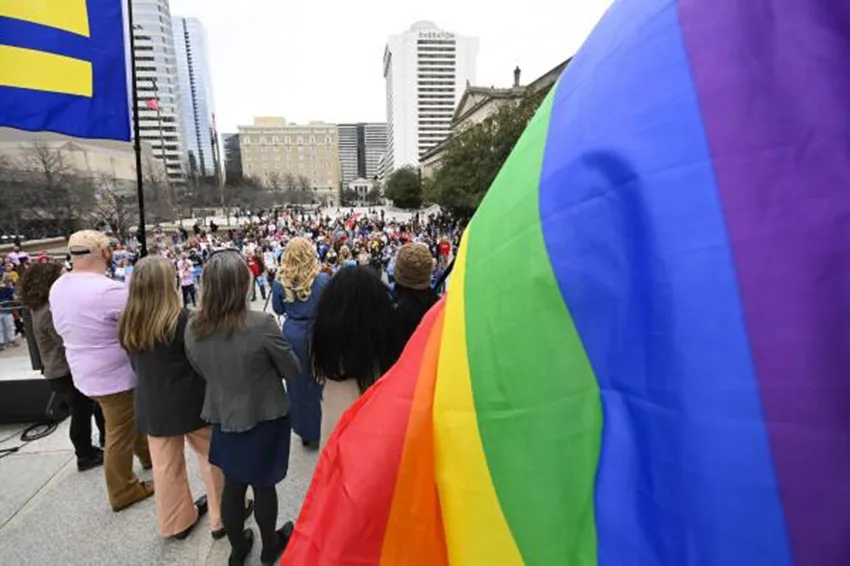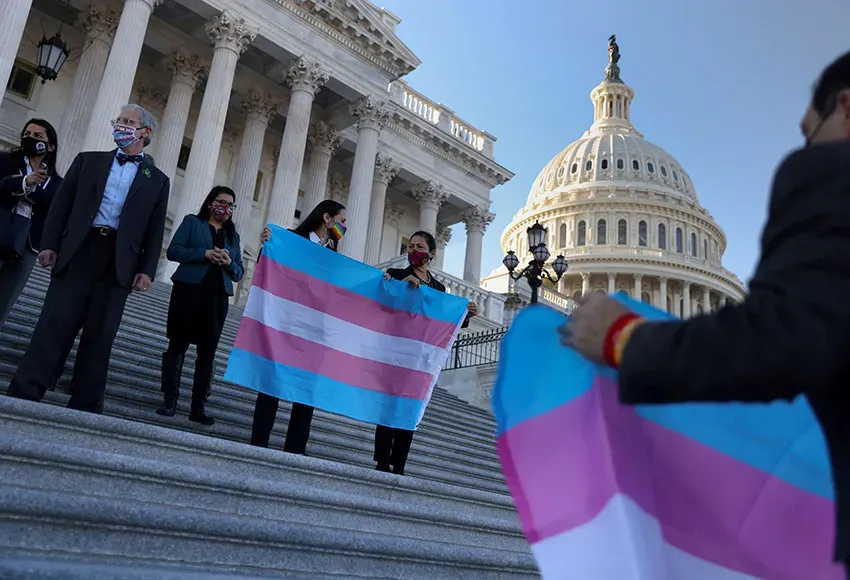Montana's Two-Spirit community files lawsuit against anti-Trans law
Some in Montana's Two-Spirit community are challenging a state law that defines sex as binary, because it "infringes" on their spiritual and cultural beliefs.
The law, Senate Bill 458, defines "male" and "female" based on the presence of XY or XX chromosomes as well as reproductive systems. The legislation, which took effect in October, inserts those definitions of male and female in several parts of the state's legal code, impacting driver's licenses, demographic records, and the state's anti-discrimination law.
In October, attorneys representing the nonprofit Montana Two Spirit Society along with a group of Transgender, Intersex, and Nonbinary residents, filed a lawsuit in Missoula County District Court challenging the law.
They argue that the state's definitions of sex "improperly categorizes many Montanans, excludes others from legal recognition entirely, and deprives them of the benefits and protections of myriad state laws." The complaint also argues that the law violates Montana's individual dignity, equal protection, privacy, and freedom of speech laws.
The lawsuit names Montana Republican Gov. Greg Gianforte and Montana Attorney General Austin Knudsen as defendants. A spokesperson for the governor told CNN the governor's office "generally doesn't comment on ongoing litigation." Emilee Cantrell, a spokeswoman for the Montana Department of Justice, said the state is expected to file an answer to the lawsuit by December 14.
Two-Spirit is an umbrella term that emerged in the 1990s, referring to people in many Indigenous and Native American communities who historically had both a masculine and feminine spirit, and who filled specialized social and spiritual roles. Some Native American people who are Queer also use the term to self-identify.
Prior to colonization, Two-Spirit people had roles of honor in healing and ceremonies, but as Indigenous people were forced to assimilate, that part of their tradition was lost.
While many things have changed since colonization, violence aimed at Queer Indigenous and Two-Spirit people remains prevalent, and they experience high levels of mental health issues.

Justice Department calls Tennessee laws against people living with HIV "discriminatory"
Tennessee's decades-old aggravated prostitution statute violates the Americans with Disabilities Act, the Department of Justice announced Friday. After an investigation, they warned the state could face a lawsuit if officials don't immediately cease enforcement.
Tennessee is the only state in the United States that imposes a lifetime registration as a "violent sex offender" if convicted of engaging in sex work while living with HIV, regardless of whether the person knew they could transmit the disease.
Queer and civil rights advocates have long criticized the measure as discriminatory, making it almost impossible to find housing and employment due to the restrictions imposed on violent sex offenders. Earlier this year, the American Civil Liberties Union and the Transgender Law Center filed a lawsuit seeking to overturn the law in federal court.
The department is calling on the state to not only stop enforcing the law but also remove those convicted under the statute from the sex offender registry and expunge their convictions. The agency also says Gov. Bill Lee should introduce legislation to repeal the law.
The ADA, the landmark 1990 federal law, prevents discrimination against disabled people from employment to parking to voting and other areas. HIV and AIDS are considered disabilities under the ADA because they substantially hinder life activities.
The department's letter was addressed specifically to Attorney General Jonathan Skrmetti, Tennessee Bureau of Investigation Director David Rausch, and Shelby County District Attorney Steven Mulroy.
A spokesperson for the Tennessee investigation bureau said officials were reviewing the letter but had no other response to the DOJ's investigation.
The DOJ letter details several of the struggles of those with aggravated prostitution convictions. A lifetime sex offender registration can stop people from visiting with their grandchildren, revoke job offers, and severely limit housing options. One person shared that they were barred from taking a course to get a general education diploma because children might be present in the building.
The lawsuit was brought by four unidentified people and OUTMemphis, a nonprofit that serves Queer people.
"OUTMemphis welcomes the DOJ's findings that, through its outdated and punitive aggravated prostitution law, Tennessee is discriminating against people living with HIV," said Molly Quinn, its executive director, in a statement. "We agree, and that's why we are suing to get the law struck down. Whether this issue is resolved informally or in court, it is long past time to end HIV criminalization."


